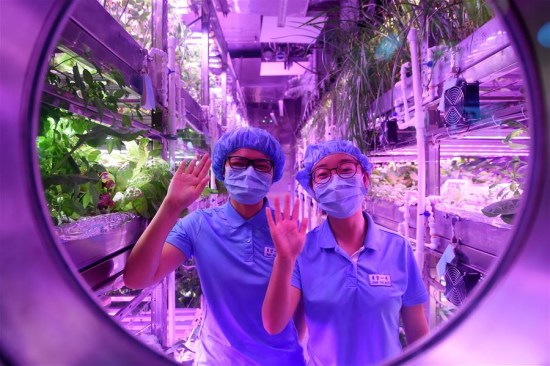
Two volunteers greet from inside the Lunar Palace 1, a facility for conducting bio-regenerative life-support systems experiments key to setting up a lunar base, in Beijing University for Aeronautics and Astronautics (BUAA) in Beijing, capital of China, May 10, 2017. (Xinhua/Ju Huanzong)
After one year of living in the "Yuegong-1" or "Lunar Palace" in Beijing, four volunteers stepped out of the simulated space cabin with cabin-grown vegetables in their hands. The success of this research project, "Yuegong-365," set a new world record for the longest stay in a self-contained cabin.
Started on May 10, 2017, the 365-day project lasted five days longer than planned. The delay, which was intentional, was meant to test the volunteers' psychological states in unexpected situations.
Placed in Beihang University in Beijing, Yuegong-1 has a total area of only 150 square meters, consisting of two plant cabins and the comprehensive cabin. The volunteers successfully grew fruit and vegetables such as strawberries, soybeans and carrots in the laboratory.
Eight volunteers, all students from Beihang University, were divided into two groups. Two men and two women entered for an initial stay on May 10, 2017. After 60 days, they were relieved by another group of four, who stayed 200 days. The second group of students came out on January 26, 2018, and the initial group entered again, and stayed until Tuesday.
After leaving the cabin, the four volunteers were sent directly to the hospital for a health check. "We will be isolated again," a female volunteer told CCTV. "We will go through different physical examinations, and will be free after a one-week observation period."
The experiment is designed to test a bioregenerative life support system (BLSS), in which animals, plants and microorganisms co-exist in a sealed environment, simulating a lunar base. It also examines the physical and mental conditions of humans in such an environment. Oxygen, water and food are recycled within the BLSS, creating an Earth-like environment.
The Yuegong-365 project could strengthen China's knowledge and technical know-how, and help the country's scientists understand exactly what will be required for humans to remain on the moon in the medium and long terms.
According to Professor Liu Hong, chief designer of Yuegong-1, the purpose of the project was to test the stability of the BLSS when "astronauts" take turns living in the cabin.
"Eighty percent of the food could circulate inside," Professor Liu said in the monitoring room near the cabin. "So in the future, if we want to live on the moon, Mars or anywhere that's not the Earth, the technology can increase our chances to survive."
"The experiment showcased our technology, which can support the astronauts, or volunteers, staying inside (the cabin) for a long duration," she added.
By Guo Meiping


















































